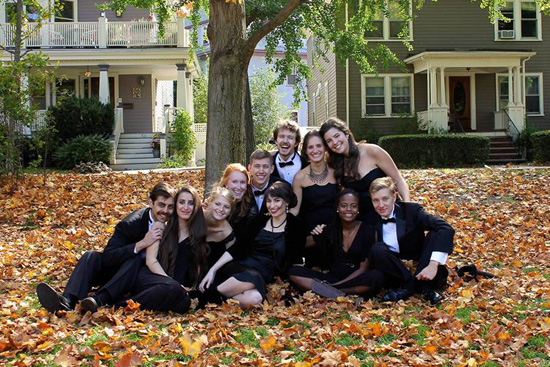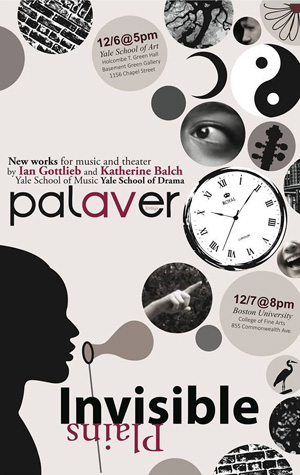Musicians Mix Classical Music and Social Awareness
Palaver Strings, founded by BU students, to perform this weekend

The current members of Palaver Strings include (front row, left to right) Alex Goodin (CFA’15), Brianna Fischler (CFA’15), Maya French (CFA’15), Elizabeth Moore (CFA’14), Danielle Wilson (CFA’16), Nikolai Renedo (Tufts) and (back row, left to right) Emilee Hollis (CFA’15), Matthew Smith (Boston Conservatory), Ryan Shannon (New England Conservatory), Gabrielle Fischler (CFA’15), and Rachel Iba (Oberlin). Photo courtesy of Palaver Strings
Ask most college students today about classical music and they’re likely to mention names like Mozart, Beethoven, or Bach. Few would picture a group of classically trained string musicians performing in an Allston basement, at a local food pantry, or in a correctional facility. But for the dozen musicians who make up Palaver Strings, bringing music to underserved communities is as important as making beautiful music. And on Sunday, the group—started at BU in September 2012—will perform at the College of Fine Arts Concert Hall in a concert that will include the debut of a piece composed by Ian Gottlieb (CFA’12).
“We’re trying to figure out what it means to be a socially engaged artist and, specifically, socially engaged musicians,” says double bassist Alex Goodin (CFA’15). “What does that mean for who we play for and why we play?”
As concert halls across the country struggle to fill seats and find new audiences, Palaver is doing just that in a unique way. By performing in nontraditional venues like hospitals and places like Pavement Coffee House, where they performed in September to raise funds for Doctors Without Borders, the group is winning over new fans, including college students—an experience they say is as rewarding as the recognition they’re earning in the classical music world.
“People who haven’t heard classical music before are moved in a completely different way, to a higher level, than those who have heard this type of music before,” says violinist Brianna Fischler (CFA’15). “That’s way more gratifying as a performer.”

The group was founded almost accidentally. After violinist Maya French (CFA’15) established a BU chapter of the Liberian Education Fund (LEF), which provides scholarships for Liberian students, she enlisted the help of some friends to put on a benefit concert. Viola player Elizabeth Moore (CFA’14) and cellist Nikolai Renedo (an undergraduate at nearby Tufts University), both high school friends with whom French had played in the Bay Chamber Music School in Maine, were among the first to sign up, along with Fischler, Goodin, and Emilee Hollis (CFA’15). The group’s name was inspired by the traditional Liberian circular dwelling called a palaver.
As the musicians continued to play more concerts for LEF, “We started thinking that the musicians who are playing are also invested in a lot of different causes and social issues, humanitarian issues,” says Gabrielle Fischler (CFA’15), adding that the group decided to “pair the two ideas together.” Since its creation two years ago, Palaver Strings’ mission has grown to include increasing social awareness for causes that matter to the group.
The roster has changed since 2012, but still retains a strong BU presence. French, Moore, Brianna Fischler, Goodin, and Hollis have been joined by violinists Gabrielle Fischler (Brianna and Gabrielle are sisters) and Danielle Wilson (CFA’16), and violist Elizabeth Moore (CFA’14), as well as students from the Boston Conservatory, New England Conservatory, and Oberlin College.
In an effort to reach even more people, Palaver recently began a collaboration with Groupmuse, a website that connects classical musicians to individuals wiling to host them in their homes. The group’s house concerts, each with its own distinct theme, utilizes visual arts, dance, and performance art for a multimedia experience. The concerts are open to the public; there is a suggested donation of $10.
One such session featured an arrangement of works by the indie folk band Bon Iver, founded by singer/songwriter Justin Vernon. With the audience seated in the center of a small Allston living room that had been stripped of its furniture, the musicians lined the perimeter of the room, circling the crowd, immersing listeners with an intensifying and intricate layering of lush strings.

During their September concert at Pavement Coffeehouse, Palaver performed Prokofiev ‘s Quartet No. 2 while a dancer improvised choreography. “We’re breaking down normal conventions of how you’d see the piece and how it’s presented,” says Hollis, who plays the double bass. “It makes you listen to the music differently.”
This Sunday, in their final concert of the semester, Palaver Strings will premiere a new piece, Concerto Grosso for String Orchestra by Ian Gottlieb (CFA’12), one of the original members of the group. Gottlieb, who now studies at the Yale School of Music, says that he drew on his experience with Palaver as inspiration for his composition, structuring the concerto to evoke the experience of group collaboration—the dialogue, contention, and decision-making process that takes place without a designated leader (Palaver has no appointed conductor). Gottlieb wrote the concerto specifically for Palaver and has dedicated it to the memory of Marc Johnson, a School of Music adjunct professor of cello and mentor to several members of the group, who died earlier this year.
Palaver Strings will perform Invisible Plains: New Works for Music and Theater, a concert which will include the debut of Ian Gottlieb’s Concerto Grosso for String Orchestra, on Sunday, December 7, at 8 p.m. in the College of Fine Arts Concert Hall, 855 Commonwealth Ave. The concert is free and open to the public.
Paula Sokolska can be reached at ps5642@bu.edu.
Comments & Discussion
Boston University moderates comments to facilitate an informed, substantive, civil conversation. Abusive, profane, self-promotional, misleading, incoherent or off-topic comments will be rejected. Moderators are staffed during regular business hours (EST) and can only accept comments written in English. Statistics or facts must include a citation or a link to the citation.